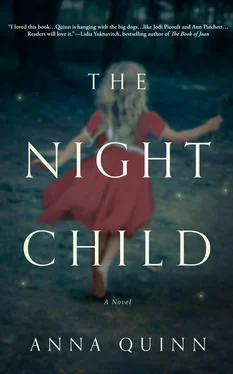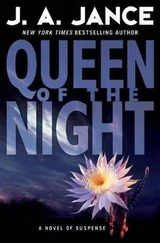“Your brother was here earlier. He doesn’t want you to worry about your father. He wants to see you. He said your father didn’t come with him—he stayed in Rochester. He wants you to know your father is not physically capable of travel, nor, he said, emotionally able. ‘Weak and ineffectual, as always,’ he said.”
She should feel relieved, but she isn’t—she feels a surge of nausea, anxiety swelling, heads of penises edging their way in—she fights to follow her breath, to stay present.
“You wrote that you remembered the Valentine’s dress, that Margaret is telling the truth,” David says. He’s decided on a new direction. And then ever so carefully, he says, “Nora, did your father hurt you?”
Her eyes well. Her father. Her daddy. She’d loved him. She’d hated him. She’d loved him more than anyone. She’d loved him more than anything.
“Your father?” he asks.
She nods. Tears come then.
He sits there with her, silently, for a long time. As Dr. Brinkley and Carol come and go with their stethoscopes and pills and worried faces, he stays. He stays and wipes her tears and sits by her in silence until she stops crying.
He takes her hand. “Nora, when your father abused you, you were a child. You couldn’t make sense of what was happening to you. Let me tell you something. When I was a child, I lived in San Francisco. One day there was a tremendous earthquake. The first earthquake I’d ever experienced—a 7.0. I was terrified. I was home alone with my father, and I thought we would die. Everything shook and crashed. An entire wall of our house crumbled in front of our eyes. I sat bundled into my father, the two of us curled up in the bathtub. I couldn’t stop shaking. I felt him shaking. When things finally quieted, we sat for awhile, not moving. Not talking. And then he turned me so he could look me in the eyes and said, ‘That was an earthquake. We’re okay,’ and then we talked about it until I stopped shaking.”
She gazes vacantly out the window. Searches for the silver of Puget Sound between skyscrapers. There it is. The mountains a snowy wall in the distance. She presses her face to the glass; the wire mesh behind it makes her feel like she’s in a confessional.
“Nora,” David says, even more softly, “a child who is sexually abused doesn’t have someone nearby naming what happened, saying that was sexual abuse and that’s a crime. Your father did a horrible thing to you and is very, very sick. He had no right to do such a thing. Do you hear what I’m saying? When you can’t name a trauma, or speak about it—”
Is there a name for what my father did?
“Love,” her father had said. “This is love.”
CHAPTER TWENTY-FOUR: February 8, 1997
Nora wakes up in a different room. She’s still in the hospital—with its scoured air and slack light, but this room has an eerie, lonely feeling about it, and a ripple of panic sweeps through her. The IV is gone, but where her hand rests, a white cotton strap—a restraint—hangs from the metal railing of the bed. She reaches up and finds the gauze has been removed from her head.
“They’ve moved you, Nora.” It is David. He sits in the deep windowsill, a white blizzard outside behind him. With his white hair and white beard, everything white, she thinks wildly that maybe she’d been in a goddamned nightmare, and now the white will swallow up the darkness and she’ll wake up with the horrible ordeal behind her.
“You woke up last night, hysterical, and when they couldn’t calm you, they medicated you and moved you here—it’s a quieter room.”
Down the hall a woman screams. A murmuring of voices rush by. She’s not going to be rescued by the white. She’s in the One Flew over the Cuckoo’s Nest ward.
David pulls up a chair next to her. “You are in the psychiatric unit of the hospital. Dr. Brinkley, Paul, and I thought—”
But her actions stop his words as she struggles to sit up, her ribs still aching. She grabs a notebook from the bedside table and writes angrily.
Paul?
“Nora, when the hospital told him they couldn’t hold you any longer in the emergency unit, he called me, and well—after last night’s trauma, we spoke on the phone and decided this would be best.”
The sting of Paul making this decision fuels her temper. Her face burning, she writes with trembling fingers: I do NOT need to be here. I want to go home.
She aches for her daughter, wants to wrap her arms around her, even hear her giggle about the upcoming Valentine’s Day party. Erase old memories. Make new ones.
“I know this is hard,” David says, “but it’s really important you rest—that nothing, no one, triggers another crisis—that you get your voice back.”
Will I ever get better?
“Listen,” he says, leaning in, his brown eyes warm and clear. “The fact that you remembered the Valentine’s dress while you were awake is huge. The splitting of your mind was, and is, a brilliant coping mechanism. Your brain’s entire physiology changed so you could endure what happened and go on living your life. As a child you had no control over your body. And ever since that time, you have been in control. You’ve had control over emotions that may have overwhelmed you, overwhelmed anyone, saved your life. And now, you’ve remembered something—something that could mean your brain is attempting to integrate—heal the splitting. That’s huge. Remember when we talked about looking for patterns and images that could give us clues to your past? Those images are linking. It’s like finding the missing beads for your rosary. It means—” he hesitates.
She mouths, “What?”
“Some incest victims survive by ignoring what the perpetrator did—by refusing to believe it. They come to me again and again telling me they are crazy—and believing it—coming to me with addiction issues, relationship issues, week after week, until finally, some of them admit to the truth of their past. Margaret is your truth. Which is why it’s possible,” he says, “that the integration will include Margaret.”
You mean she might go away?
“Yes, potentially.”
But he has barely uttered the word when the thinning door in her mind begins to slide, slide, slide shut and she drops the notebook and the silence spreads and she is gone.
“Nora wants me to go away?” says a small, tearful voice.
“Margaret? Margaret, is that you?”
She tries to pull the blanket over her head, but Nora’s bruised ribs are hurting her, and it’s hard, but she gets it over herself. Once she’s all the way covered, she listens for where he is.
“Margaret?”
He sounds too close. “Could you please move away from me?” she says, her voice barely a whisper.
He screeches his chair back.
“How’s this?”
She peeks out of the blanket. “A little more.”
He backs up another few feet. After a minute he says, “Margaret, thank you for coming,” and then, gently, “Is there something you want to tell me?”
“Please,” she says, “could you please lock the door?”
“We can’t lock the door, but everyone has promised to stay outside unless I call them in. You are very safe here.”
She will keep being brave. She will talk to him.
“Margaret, did you come to help Nora?”
“I hate Nora. I hate her,” she says louder than is safe and she forgets to keep the blanket over her head and she sees him see her.
“No one will hurt you, Margaret. No one.”
She wiggles back under the blanket now. She will stay hiding.
“Margaret, why do you hate Nora?”
She shouts in a tremulous voice from under the covers. “You know why! Nora broke us! She ran us in front of a car and the car slammed us and broke our chest and banged our head and we had a mean needle in our hand and she’s not speaking and now …”
Читать дальше












